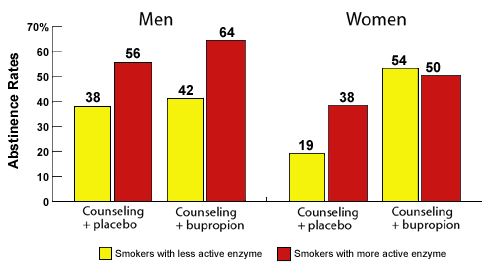Smokers who want to quit can get help with a variety of treatments, including counseling, nicotine replacement therapy (patches, gum, lozenges, or inhalers), and medications. Some smokers use these treatments and succeed; for many, however, the discomfort of withdrawal and craving for nicotine lead to relapse. Recent NIDA-funded research suggests that our genes may partly explain this variable success.
 Genetically Determined Enzyme Activity Affects Treatment Response. In a study of 426 smokers in a 10-week smoking cessation program, those with a gene form that decreases activity of an enzyme that metabolizes nicotine reported greater craving and were less likely to achieve abstinence during treatment than were participants with the gene form that increases the enzyme's activity. Supplementing counseling with bupropion helped women with the less active enzyme nearly triple their abstinence rate to 54 percent--roughly equal that of women with the more active enzyme.
Genetically Determined Enzyme Activity Affects Treatment Response. In a study of 426 smokers in a 10-week smoking cessation program, those with a gene form that decreases activity of an enzyme that metabolizes nicotine reported greater craving and were less likely to achieve abstinence during treatment than were participants with the gene form that increases the enzyme's activity. Supplementing counseling with bupropion helped women with the less active enzyme nearly triple their abstinence rate to 54 percent--roughly equal that of women with the more active enzyme.The research evaluated the effect of an enzyme, designated CYP2B6, on craving and relapse. This enzyme breaks down nicotine in the brain. Some people's genes produce a more active form of the enzyme, while others have a less active form. Dr. Caryn Lerman at the NIDA- and NCI-supported Transdisciplinary Tobacco Use Research Center (TTURC) at the University of Pennsylvania found that among smokers enrolled in a smoking cessation program, those with the genetic variant that decreases activity of CYP2B6 reported greater craving than did those with the more active form of the enzyme. Moreover, those with the less active enzyme were 1.5 times more likely to resume smoking during treatment.
The same enzyme helps break down bupropion, an antidepressant medication that acts on the brain's dopamine system--where nicotine exerts much of its addictive influence--and helps some smokers quit. Dr. Lerman, along with colleagues at Georgetown University in Washington, D.C., the State University of New York at Buffalo, and Brown University in Providence, Rhode Island, also investigated the relationship of CYP2B6 activity with bupropion treatment. They found that bupropion nearly tripled the success rate for women with the less active enzyme.
"These findings provide initial evidence that smokers who have decreased CYP2B6 activity experience greater craving for nicotine than those with the more active form of this enzyme," Dr. Lerman says. "Perhaps of greater interest is the preliminary evidence that, among women, bupropion may overcome the effect this genetic predisposition has on relapse."
Genes, Treatment, and Abstinence
Most people--about 70 percent of the U.S. population--inherit two copies of the "C" variant of the gene that influences CYP2B6 activity. The rest of the population inherits from one or both parents the less common form of the gene--the "T" variant associated with decreased CYP2B6 activity. Among the 426 participants (232 men, 194 women) in the TTURC study, 128 (29.6 percent) had one or two copies of the T form of the gene. All participants received counseling to quit smoking; 229 received bupropion (300 mg/day) and 197 received placebo throughout the 10-week study. The participants provided weekly reports on craving and smoking rates. Abstinence (7 consecutive days without smoking) was verified with blood tests. At the end of treatment, participants who received counseling and bupropion had higher abstinence rates than those who received counseling and placebo. With one exception, participants with the less active enzyme had lower abstinence rates than those with the more active enzyme. Women with the less active enzyme who received bupropion showed the largest treatment effect, with 54 percent achieving abstinence, up from a 19-percent rate among women in the placebo group, notes Dr. Lerman.
Theories To Explain Outcomes
The higher abstinence rate with bupropion for women with the lower activity enzyme may be due, in part, to reduced susceptibility to low moods that accompany nicotine withdrawal; overall, women reported more negative feelings than did men when asked to rate their mood during withdrawal. "This rate may reflect better management of the negative moods and craving that abstinence can create. But more study is needed to clarify the mechanisms by which bupropion influences smokers' success in quitting," Dr. Lerman says.
Researchers theorize that the association between the less active enzyme and increased craving could be the result of nicotine's remaining longer in the brains of smokers with the less active enzyme. When nicotine lingers in the brains of these smokers, it may change their brain cells more profoundly than those of smokers with the more active enzyme. If so, the changes might produce more severe addiction marked by more intense craving during abstinence and increased risk of relapse.
"This study offers additional evidence of the important role genes play in smoking and treatment," says Dr. Joni Rutter of NIDA's Division of Neuroscience and Behavioral Research. "While illustrating the increased craving and vulnerability to relapse that may be associated with inherited traits, it also suggests that properly selected treatment matched to a patient's characteristics--in this case, bupropion for some women--can improve a smoker's chance of quitting."
Source
- Lerman, C., et al. Pharmacogenetic investigation of smoking cessation treatment. Pharmacogenetics 12(8):627-634, 2002. [Abstract]
